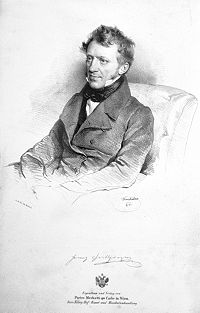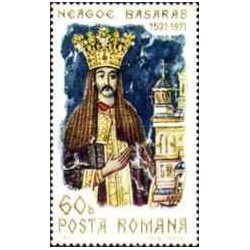- جدید
- ناموجود



توجه : درج کد پستی و شماره تلفن همراه و ثابت جهت ارسال مرسوله الزامیست .
توجه:حداقل ارزش بسته سفارش شده بدون هزینه پستی می بایست 180000 ریال باشد .
توجه : جهت برخورداری از مزایای در نظر گرفته شده برای مشتریان لطفا ثبت نام نمائید.
| Franz Grillparzer | |
|---|---|

Lithograph by Josef Kriehuber, 1841
|
|
| Born | 15 January 1791 Vienna, Austria |
| Died | 21 January 1872 (aged 81) Vienna, Austria-Hungary |
| Occupation | Dramatist |
| Nationality | Austrian |
Franz Seraphicus Grillparzer (15 January 1791 – 21 January 1872) was an Austrian writer who is chiefly known for his dramas. He also wrote the oration for Ludwig van Beethoven's funeral.[1]
Franz Grillparzer was born in Vienna, Austria. His father, E.J. Grillparzer, was a severe pedant and a staunch upholder of the liberal traditions of the reign of Joseph II, and was an advocate of some standing. His mother, Anna Franziska, was a nervous, highly-strung woman who belonged to the well-known musical family of Sonnleithner.
His father destined Grillparzer for the legal profession, and, after a desultory education, Grillparzer entered the University of Vienna in 1807 as a student of jurisprudence. Two years later his father died, leaving the family in difficult circumstances. After obtaining his degree from the university in 1811, Franz first became a private tutor for a noble family; then in 1813, he entered the civil service as a clerk at the Imperial and Royal Hofkammer (Exchequer) in Austria. In 1821, he unsuccessfully applied to the position of scribe at the Imperial Library, and later that same year, he was relocated to the Ministry of Finance. In 1832, he became director of the archives at the Imperial and Royal Hofkammer, a position he held until his retirement in 1856. Grillparzer had little capacity for an official career and regarded his position merely as a means of independence.
From early youth, Grillparzer displayed a strong literary impulse. He devoted especial attention to the Spanish drama, and nearly all his writings bear marks of the influence of Calderón. His autobiography, which was written in 1853 and brings down the narrative of his life to 1836, is a model of clear, simple, and elegant prose, and it throws much interesting light both on his personal character and on the tendencies of his time. Among his posthumous writings are many fragments of literary, philosophic, and political criticism, all of them indicating a strong and independent spirit, not invariably just, but distinct, penetrating, and suggestive.
It is characteristic of him that he expresses extreme dislike of Hegel's philosophy on the ground that its terms are unintelligible. On the other hand, he gives evidence of careful and sympathetic study of Kant. Of modern literary critics, Gervinus was most repugnant to him, mainly because of the tendency of this writer to attribute moral aims to authors who created solely for art's sake. He rather maliciously says that Gervinus had one advantage and one disadvantage in writing his history of German literature, — the advantage of common sense, the disadvantage of knowing nothing of his subject.
Of a quiet contemplative nature, Grillparzer shunned general society. He never married. To a stranger he seemed cold and distant, but in conversation with any one he liked his real disposition revealed itself; his manner became animated, his eyes brightened, and a sarcastic but not ill-natured smile would play upon his lips. It was one of his sayings that the art of writing poetry can neither be taught nor learned, but he also held that inspiration will not visit a poet who neglects to make himself master of his subject. Hence before writing a play he worked hard, striving to comprehend the spirit of the age he wished to represent. He was exceedingly fond of travel, and at different times visited all the leading European countries.
After 1840, when his solitary comedy was rejected by the public, he almost passed from the memory of his contemporaries. Fortunately for him, his admirer Heinrich Laube settled in Vienna in 1849 as artistic director of the court theatre. By and by Laube reintroduced on the stage some of Grillparzer's forgotten works, and their success was immediate and profound. To his own surprise, Grillparzer became the most popular author of the day; he was ranked with Goethe and Schiller, and lauded as the national poet of Austria. On the eightieth anniversary of his birthday all classes from the court downwards united to do him honour; never, probably, did Vienna exert herself so much to prove her respect for a private citizen.
He was buried with an amount of ceremony that surpassed even the pomp displayed at Klopstock's funeral. He was originally buried in the Währinger Cemetery in Vienna, now known as Schubertpark. He now lies in Hietzinger Friedhof.
تشکر نظر شما نمی تواند ارسال شود
گزارش کردن نظر
گزارش ارسال شد
گزارش شما نمی تواند ارسال شود
بررسی خود را بنویسید
نظر ارسال شد
نظر شما نمی تواند ارسال شود

check_circle
check_circle















